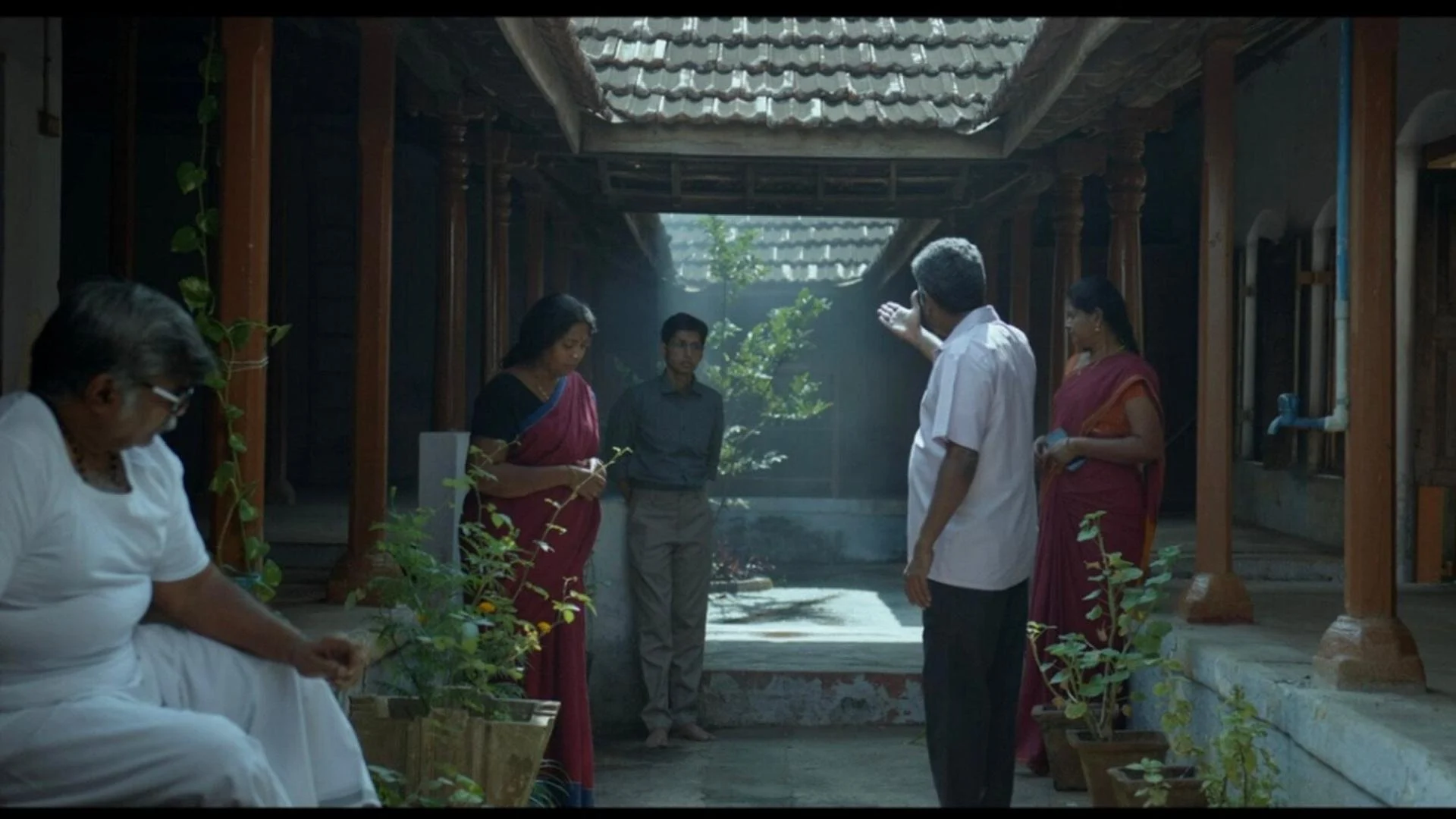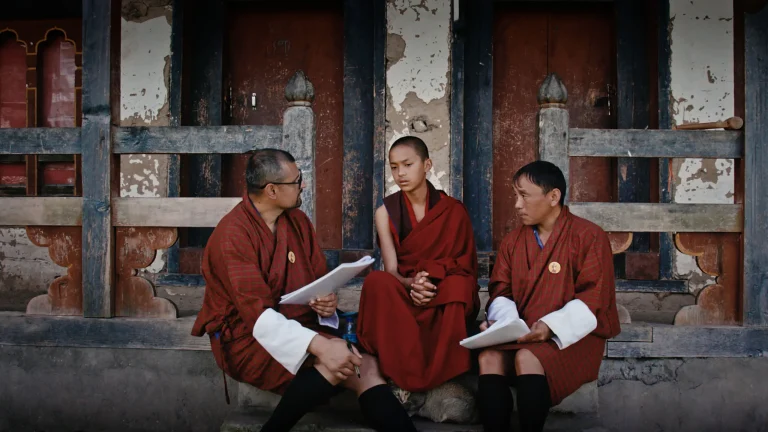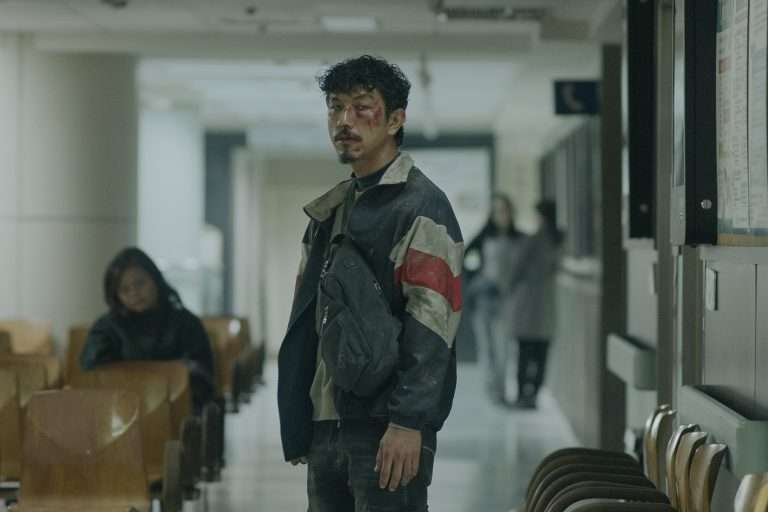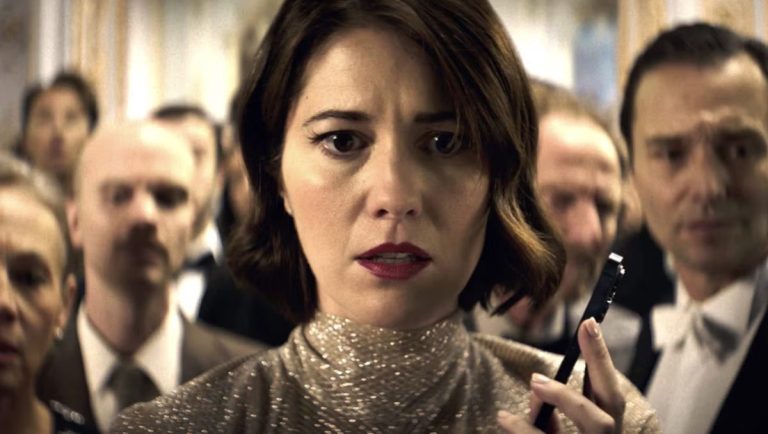Genderism has become a debatable area of decision-making in this era of desiring change. We witness the expansion of the LGBTQIA+ community to specific pronouns and orientations in multiple countries, which is, in fact, an important aspect to look upon. Adopting a more LGBTQIA+-approved stance requires more time for legislative changes that may take time to happen. However, the constraints imposed by national law aren’t the only obstacle this community must surmount, as they must also overcome the equally formidable test of societal acceptability. In “Blue Sunshine,” Samyuktha Vijayan delves deeply into this subject matter, tackling every obstacle that arises along the course of the circumstance.
Aravind is a teacher with abundant wisdom, a strong sense of responsibility, and admirable modesty. He is a living example of a perfect teacher that any student would want. Aravind may be outgoing with his close buddy Haritha but is more reserved among his colleagues. Back at home, Aravind seems to be distancing himself from his parents, and he is agitated, moody, and troubled almost all the time. Issues of marriage and financial burden circulate him, which suffocates Aravind slowly. Despite this, Aravind remains calm on the outside while battling his inner feelings. Little do we know that Aravind has made a crucial decision and is thinking of a significant change in his life – gender transitioning to become a transgender woman (Bhanu). What comes along the way to sustain his transitioning process is the film’s focus.
I believe Rituparno Ghosh’s “Chitrangada” (2012) is notably one of the most affecting films made on the subject of gender transitioning that remains fresh to this very day. The constant debate that the protagonist had with her mother brought various thought-provoking statements on transitioning. There’s also Lukas Dhont’s “Girl,” which shares a ballerina’s plight while transitioning. As for “Blue Sunshine,” the approach taken comes from the perception of the social surroundings and the acceptance anxiety of an individual during the initial stages of transitioning.
As far as societal acceptability goes, we see how the LGBTQIA+ population in Southeast Asia is met with contempt, animosity, and outright rejection. Despite annulling section 377 of the IPC in India, the social stigma of accepting this community remains unchanged. Throughout “Blue Sunshine,” filmmaker Samyuktha Vijayan ferociously depicts every observable and palpable facet of social exclusion. An excellent illustration of the scenario may be seen in a scene where Aravind’s relatives, having learned the truth, talk about the negative aspects of his transitioning process. As viewers witness the community’s portrayal of negative remarks and disdain, they will also feel how much it disrupts Aravind’s ability to lead a peaceful existence.
While it seems that education and knowledge could improve understanding, filmmaker Samyuktha shows this is not necessarily true. We are exposed to the perception of learned people from the context of the school and corporate offices, where the situation is equally heartbreaking. From Vice Principals to colleagues and government employees, the repulsive manner is shown through management and work-based rejections. Samyuktha paints an unsettling portrait of transphobia, expanding on how trans women are rejected regardless of their intelligence or capabilities. There is also the inclusion of schools supporting transitioning as a tool for a business model to attract future LGBTQIA+ students, which doesn’t seem healthy in most parts.
A chat between Aravind and a psychiatrist is one of the film’s most memorable portions. The soothing atmosphere permeating their discourse as they address topics like self-acceptance and anxiety problems amazes me. While Aravind is transitioning, the psychiatrist’s philosophical framework doesn’t seem to veer off into an artistic realm but keeps moving forward with soulful progress. This section also shows how crucial coping mechanisms are and how Aravind struggles internally with self-confidence. From self-voice modulations to surgical approvals, the technicality of transitioning is meticulously discussed, which was both absorbable and attentive for viewers.
At this point, it seems like a vast amount of mental health issues are covered in the blink of an eye. However, what makes “Blue Sunshine” stand out is Samyuktha’s script, which delves deep into every aspect, including the character’s history of trauma. Another crucial aspect is the inclusion of a student named Karthik in Bhanu’s school. In introducing Karthik, the director shows how her personal experiences with bullying, verbal abuse, and physical assault have impacted her mental health. This emphasizes how repeated bullying can lead to self-destruction among young individuals. This raises two crucial questions: would a school-based social awareness program for LGBTQIA+ youths make a difference? Should anti-bullying initiatives continue to be forward-thinking, or is there a more suitable course of action that would benefit students?
The film’s biggest strength is Samyuktha Vijayan’s spectacular performance as Aravind and Bhanu. Viewers will witness every step of endurance from Aravind’s existence up to Bhanu’s transformation, which doesn’t offer much relief throughout the way. Samyuktha’s performance was personal, impactful, and definitely soulful. “Kayamai Kadakka” actor Masanth Natarajan is also here, playing Karthik’s role. Despite his brief appearance, his acting skills convey a compelling portrayal of a bullied and depressed victim. Viewers would truly understand the extent of his despair as they witness his seemingly endless torment.
“Blue Sunshine,” which won the Best Film award at Tasveer Film Festival 2023, is a riveting and significant film on everything that darkens a poignant transitioning process. Beena Kurien’s rendition of the Neela Suriya Oli (“Blue Sunshine”) song might be peaceful and affectionate. Still, the whole context of the film shares the misery of every transitioning individual to survive in a closed-minded society. Intensely gripping and personal, “Blue Sunshine” is an educational film that is structured to be compelling for everyone. It is dedicated to every transgender individual who wants an ear to listen, a heart to accept, and a voice to guide them. It is also a guidebook for individuals who are reluctant to have an open mind on this issue, which has the ability to destroy a person entirely.
Read More: The 20 Best Indian Movies of 2023
Blue Sunshine (2024) Movie Links: IMDb, FilmFreeway
Blue Sunshine (2024) Movie Cast: Samyuktha Vijayan, Masanth Natarajan, Gajaraj, Geetha Kailasam







